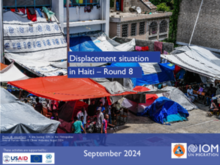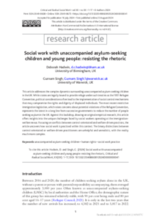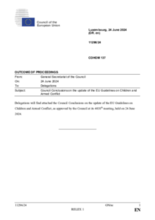Displaying 21 - 30 of 530
This Human Rights Watch report documents how children with disabilities in Gaza face dangerous situations and additional difficulties as they struggle to comply with frequent evacuation orders and a lack of effective advance warning of attacks.
This IOM report reveals that there are more than 700,000 people currently displaced within Haiti, 52% of whom are children. Haiti is experiencing an unprecedented crisis that has affected the entire population, including the many orphanages operating there.
This study explores Ukrainian responses to internally displaced people during the first and second waves of war-induced displacement and internal migration in Ukraine, which took place after the annexation of Crimea in 2014 and after the full-scale invasion of 2022. It also addresses the unique challenges faced by Ukrainian social work professionals in supporting displaced people, service people and their families, disabled veterans, and orphaned children as the war continues and also for resettlement in a post-war context.
A new report by the International Data Alliance for Children on the Move (IDAC), Climate Mobility and Childhood: Examining the risks, closing the data and evidence gaps for children on the move, considers how the well-being of children may be affected when climate change and human mobility intersect in their lives – or, what can be described as experiences of climate mobility. This Executive Summary provides the key messages and main findings of the report's four sections.
This report by the International Data Alliance for Children on the Move (IDAC) sheds light on how climate mobility is impacting children’s well-being and offers recommendations for ensuring that children affected by climate-related migration are not overlooked.
This article addresses the complex dynamics surrounding unaccompanied asylum-seeking children in the UK.
Gillian Huebner, Executive Director of the Collaborative on Global Children's Issues at Georgetown University, spoke with Karla Jones & Brooklyn Roberts about the children who have been kidnapped and disappeared during Russia's invasion of Ukraine.
This webinar was a panel conversation hosted by the CPC Learning Network, ChildFund Alliance, the Program on Forced Migration and Health at Columbia University, and the Watchlist on Children and Armed Conflict that brought together a panel of experts to discuss the root causes leading to recruitment and involvement in activities of armed groups as well as the current context in countries such as Sudan, Colombia, Syria, Iraq, Yemen, and more.
This is the Council of the European Union's Conclusions on the update of the EU Guidelines on Children and Armed Conflict, as approved by the Council at its 4038th meeting, held on 24 June 2024.








